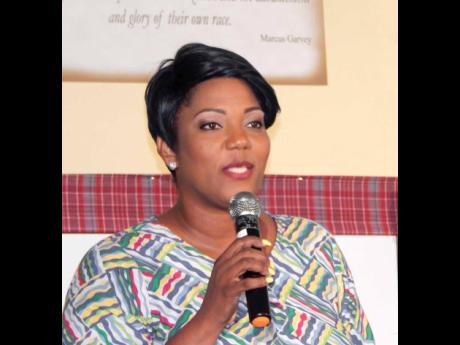Louise Bennett-Coverley the development communicator
“The development of a society cannot happen unless people participate. You get participation through communication.”
With that deceptively simple introduction, Dahlia Harris, one of Jamaica’s best-known communicators, launched into a complex talk aimed at revealing Louise ‘Miss Lou’ Bennett-Coverley as more than an entertainer. She was also a community development communicator who specialised in entertainment education, said Harris.
She was speaking on September 12 at the National Library of Jamaica on East Street at the ceremonial unlocking of the Miss Lou archive, a large collection of audiotapes and written material produced by the multitalented cultural icon. The equally gifted Harris – an actress, playwright, producer, director, and radio and television personality – was also, on that occasion, a student of The University of the West Indies, Mona, presenting a talk based on her master’s thesis.
Entertainment education, defined by Harris as “entertainment productions with strategically placed educational content,” includes singing, dancing, drama, poetry presentations and radio programmes. The last-named was the medium Miss Lou used for her 1970s-1980s radio series Miss Lou’s Views (MLV). Harris’ thesis focuses on six of the episodes, Colour and Class, Labour Day, Jamaican Philosophy, Bush Medicine, Consumer Economic Programmes and Free Education.
Harris detailed several characteristics which contributed to the effectiveness of the programme at the time, and also to its ongoing potential. Advocating a new, internationally accepted development communication model, based on Miss Lou’s Views, Harris said that to have lasting impact, communities must be placed at the centre of development communication, and equal use should be made of both small and big (traditional) media. In the age of social media, you can’t ignore the newer platforms like Facebook, Instagram and Twitter, she said, adding that if you’re not online, you’re not appealing to the individuals to whom the issues matter most.
easily modifiable
The MLV model, she said, has the capacity to adapt its content in response to changing social challenges and to stay relevant for long periods of time. Its simple format makes it easily modifiable; instead of complex dramas with actors, scripts, and rehearsals in studios, Miss Lou was able to portray, by herself, several characters in one story.
MLV is rooted in comedy, Harris said, which is unusual for radio communication. Most are dramas – enumerating the benefits of comedy, Harris said: It attracts and sustains audience attention; it helps with social cohesion by facilitating interpersonal communication between the elite and the folk, unifying them across race and class boundaries; and it allows us to process messages in a non-judgemental way. In Colour and Class, for example, said Harris, a woman rings up a restaurant to report a strand of hair in her lunch, and what upsets her is that it is “nayga” hair. Miss Lou makes light of it, wondering if the woman would’ve eaten blonde hair. The ridiculousness of the situation softens one’s anger.
In MLV, Miss Lou invites audience participation. She requests and expects a response from the audience, starting her programmes with “Listen nuh,” and asks audiences to sing along or repeat after her.
Not only does Miss Lou use familiar cultural tools – proverbs, stories with easily identifiable characters, poems and song – to heighten the audience’s engagement, she also speaks in Patois. That makes the situation relatable, said Harris, reminding the audience that Miss Lou regarded the Jamaican language to be as important as formal English.
Through Aunty Roachy, the persona with the points of view in the series, Miss Lou becomes the voice of the ordinary person, “the people’s champion.” She speaks for the man from the country who has no access to media, and the higgler in the market who can’t get on air, Harris said.
She pointed out that the brevity (three minutes) of the episodes meant that they were easily transferable from radio to new media, adding that Miss Lou based the MLV arguments on observations from real life and so was able to provide authentic illustrations.
Miss Lou’s Views was broadcast on radio at noon because the time (the lunch hour) and medium were ideally suited for farmers who formed a large part of the programme’s audience. In fact, the Jamaica Agriculture Society was the sponsor for quite a while.
Though many thought Miss Lou was just entertaining people with her views, Harris said, she was actually shaping and changing behaviour, long before people coined the term ‘behavioural entertainment communication.’
Concluding her talk, Harris said, “Miss Lou has left us a road map for development communication, and we just need to follow it.”

